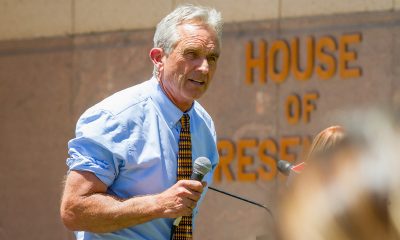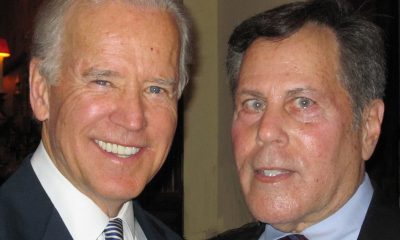Commentary
Stuck in limbo: Ukrainian government leaving LGBTQ community behind
Country saw years of steady progress before war began
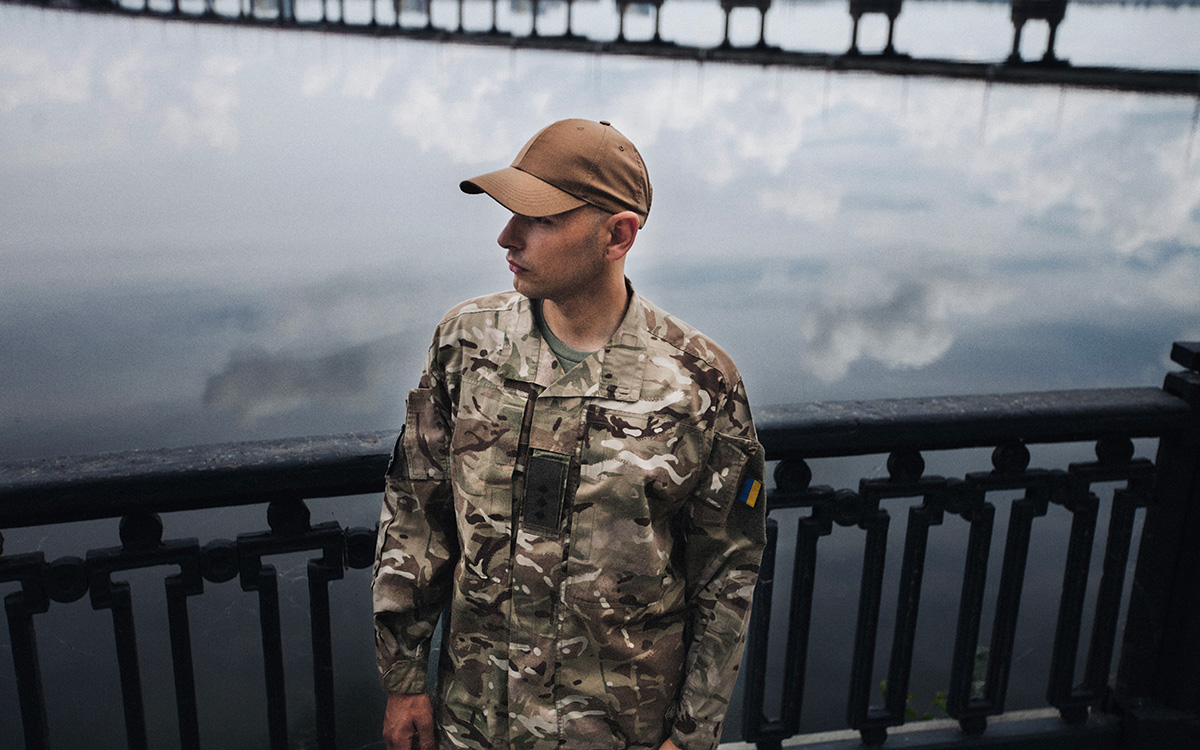
BY BOGDAN GLOBA | “It’s not the right time.”
This is the most frequent response received when advocating for the LGBTQI+ community, but the truth is it is never a suitable time for changes or progress, or even for a discussion about human rights for minorities such as LGBTQI+ people. Since the Soviet Union collapsed in 1991 and the Ukrainian Republic regained independence, a lot of progress was made. For example, Ukraine was the first country out of the post-USSR ones that decriminalized punishment for homosexuality (the Soviet Union criminalized homosexuality with seven years of imprisonment or labor camp detention.)
In addition, following the Revolution of Dignity, when the Ukraine’s Parliament passed progressive anti-discrimination bills, later they passed the amendment to the labor code that protects from discrimination in the workplace based on sexual orientation and gender identity (SOGI). An important note: The new amendment to the labor code is still the most advanced in Europe, as many countries have adopted legislation protecting discrimination based on sexual orientation without including gender identity. Even the judicial branch made some contributions. Ukraine’s constitution in Article 24 bans discrimination in general; at the same time, it doesn’t have SOGI in the list, but instead has an open list. In May 2014, after two decades, the Supreme Specialized Court of Ukraine wound down legislative debates and published a constitutional review that interpreted the constitution as banning any form of discrimination, including based on SOGI.
Unfortunately, since 2016, Ukraine’s Parliament has stopped making any legislative progress towards equality for LGBTQI+ people, and all changes have moved to the government executive level. But, even though Ukraine has changed a lot culturally and politically, among the biggest and most crucial puzzles remains unsolved — same-sex marriages or, a bare minimum for the gay community, civil partnership.
Mission impossible (or not)
The biggest roadblock to same-sex marriage in Ukraine is the constitution.
Back in 1996, when the first version of the constitution was written, Ukrainian MPs limited the institution of marriage only to men and women, preventing any marriage debates for generations. The mission to change the constitution means the LGBTQI+ movement needs to elect a supermajority in the Verkhovna Rada (300 MPs out of 450) three times, the Constitutional Court needs to approve changes, and the president needs to sign the bill.
Other examples of stalled progress make the situation look even more bleak.
Bill 5488 was introduced in May 2021 as part of a long-term affiliation process with the European Union, and part of an Action plan for National Human Rights Strategy and many U.N. resolutions, including recommendations from the U.N. Human Rights Council. This bill would change the Criminal Code to clarify language in Article 161 to add hate crimes protections for LGBTQI+ persons and other marginalized groups.
Unfortunately, the bill was dead on arrival and never voted on in the Parliament, even though it would provide protection from hate crimes not only based on sexual orientation and gender identity, but also based on race, religion, color, language, gender and disability and many more. Broadening protections against hate crimes has broad support overall. Following threats on KyivPride’s march in 2016, even the Orthodox Church of Ukraine made a statement declaring the physical attack unacceptable.
Until now, the Ukrainian Parliament held down the “last fort” of traditional family values and didn’t move forward with legislation that included SOGI. Meanwhile, LGBTQI+ Ukrainians continue to lose trust in their government’s ability or desire to protect them. Only this year, the Human Rights Ombudsman reported 17 cases of hate crimes based on SOGI and only one verdict in the court. Human rights organizations may report hundreds more hate crime cases every year (Ukraine human rights organization Nash Mir Center reported 186 documented hate crimes based on SOGI in 2020), but still, without adopting Bill 5488 or similar legislation, there won’t be an effective system preventing these hate crimes and providing justice for minorities and marginalized groups.
Another existential challenge for the LGBTQI+ community will be adopting a civil partnership bill (as same-sex marriage is realistically not possible in the coming decades). “Preserving the institution of marriage” only for straight families, but letting same-sex couples have civil recognition, could let Ukraine join the ranks of other democratic and progressive countries, while appeasing some of the conservative sector’s demands. In most European countries, a civil partnership law was the middle step before same-sex marriages were fully recognized. That institution is long overdue and most needed in Ukraine right now, while thousands of LGBTQI+ are serving in the army with a civilian partner back at home. For straight couples, if something happens with a military partner (wounded or killed), a civilian partner will obtain a variety of government benefits, from cash support to housing. In the case of same-sex couples, they are invisible to the government and have no help or recognition. A civilian person has no right to even bury their partner’s body.
The Ukrainian government demonstrates insufficient desire to fix LGBTQI+ inequality
LGBTQI+ Ukrainians are equal enough to serve your country but not equal enough to get the same benefits of straight couples, or to receive adequate protections against hate crimes. The Union of the LGBT Military in Ukraine (a non-government organization) already includes a few hundred openly LGBTQI+ members and a thousand queer military who follow their activities. While they actively fight to protect the republic, they sincerely hope politicians and government have their back. And as many politicians repeat kumbaya about all Ukrainian soldiers being heroes, it does look like they believe LGBTQI+ heroes don’t need the same benefits or support as their colleague’s heterosexual ones.
Left behind
Historically, the most significant and quickest progress for the LGBTQI+ community in Ukraine has happened (2014-2016) in combination with a few factors: The process of joining a visa-free regime with the Schengen zone and integration into the European Union, the cultural revolution when Ukrainian start to watching more Netflix and Western media than Russian channel, and U.S. government investment of great resources to promoting democratic values, including many cultural and exchange programs which help to bolster civil society and the LGBTQI+ human rights movement in Ukraine.
Unfortunately, with the changing power in the White House in 2016, the U.S. government’s priority shifted dramatically, and the Ukrainian LGBTQI+ community was left with markedly less support in the fight for their civil rights with the Ukrainian government, at the same time fighting back against Russian anti-LGBTQ propaganda, the Russian orthodox church’s lobby, and rising right-wing organizations. To add insult to injury, a few representatives from the U.S. Congress came down to Kyiv to participate in a prayer breakfast and lobby for traditional family values, including banning “gay propaganda.” In fact, a group of U.S. congressmen who came to Ukraine’s parliament to lobby for a ban on “LGBTQI+ propaganda” was led by U.S. Rep. Juan Vargas (D-Calif.). The same Vargas, who is a member of the Congressional Equality Caucus, has a 100 percent score LGBTQI+ friendly rating by the organization Human Rights Campaign and is a member of the Democratic party (which by many press releases in favor of protection of the LGBTQI+ community abroad) who represents the greatest state of California. Until now, it was only a delegation representing the U.S. Congress and including member of Congressional Equality Caucus, which made a trip to Ukraine to talk about LGBTQI+ issues, but just sadly, they talk about the need to criminalize the queer community, not share experiences of how the U.S. navigated many discussions and made gay marriage possible in the U.S.
At the same time, the European Union is losing the opportunities to stand for the human rights for LGBTQI+ in Ukraine even though the European Commission and other institutions have a lot of tools in the box to be more actively advocating for equality. Unfortunately, integration into the EU does not require recognition of same-sex marriages, as the EU doesn’t regulate marriage standards for members, and after Ukraine passed anti-discrimination legislation and banned the bare minimum of protecting the LGBTQI+ community from discrimination in the workplace, European bureaucrats checked all boxes and lost political interest in any advocacy for the queer community.
The greatest example was a few weeks window in 2022 when the EU was considering Ukrainian application to become a candidate for a member of the European Union, and the Eurocommision passed to the Ukrainian government must to do list which included the ratification Istanbul Convention but failed to mention hate crime bill there, what was already in Parliament and ready to vote, even more — less sensitive and controversial then Istanbul Convention (religion organization was massively oppose ratification on affair “gender ideology” and actively pushing back in parliaments many years.)
The last miles of the equality marathon
Ukraine did make enormous progress toward equality for the LGBTQI+ community in the past. More than that; the newish Ukrainian society is much more tolerant, welcoming and friendly. In 2015, KyivPride had a few hundred activists — more than 10,000 people participated in the last one. Surprisingly, most of them were straight people. Ukraine has the biggest movement of LGBTQI+ soldiers in Europe, the larger parents of queer children movement and many more. The picture becomes even brighter if you look at the map and realize all regional countries are going backward on LGBTQI+ issues. Belarus and Russia criminalized homosexuality back in their wish to relive the Soviet Union. Still, even Poland has a free LGBTQI+ zone movement where some regional counties declare themself free from the LGBTQI+ community. On that background, Ukraine looks like the most promising and leading country in the region. Only the Ukrainian government took a nap on the last miles of a marathon.
How can we shake the Ukrainian government and help them stop lingering on the most essential legislation for the LGBTQI+ community, and end the inequality battle in Ukraine? We can start actively using our diplomacy again. For example, Congress can send a delegation to exchange experiences on how they pass the Marriage Equality Act. The White House and State Department can be more proactive in working groups for the implementation of the U.S.-Ukraine Charter on Strategic Partnership, which includes the Ukraine government’s obligation to pass the hate crime bill, The Department of Justice can organize education program for its Ukrainian counterpart and help them to learn from the U.S. experience on preventing hate crimes. And as we are a country with the largest number of LGBTQI+ envoys in the government per square foot, can we use them at least once for the greatest good?
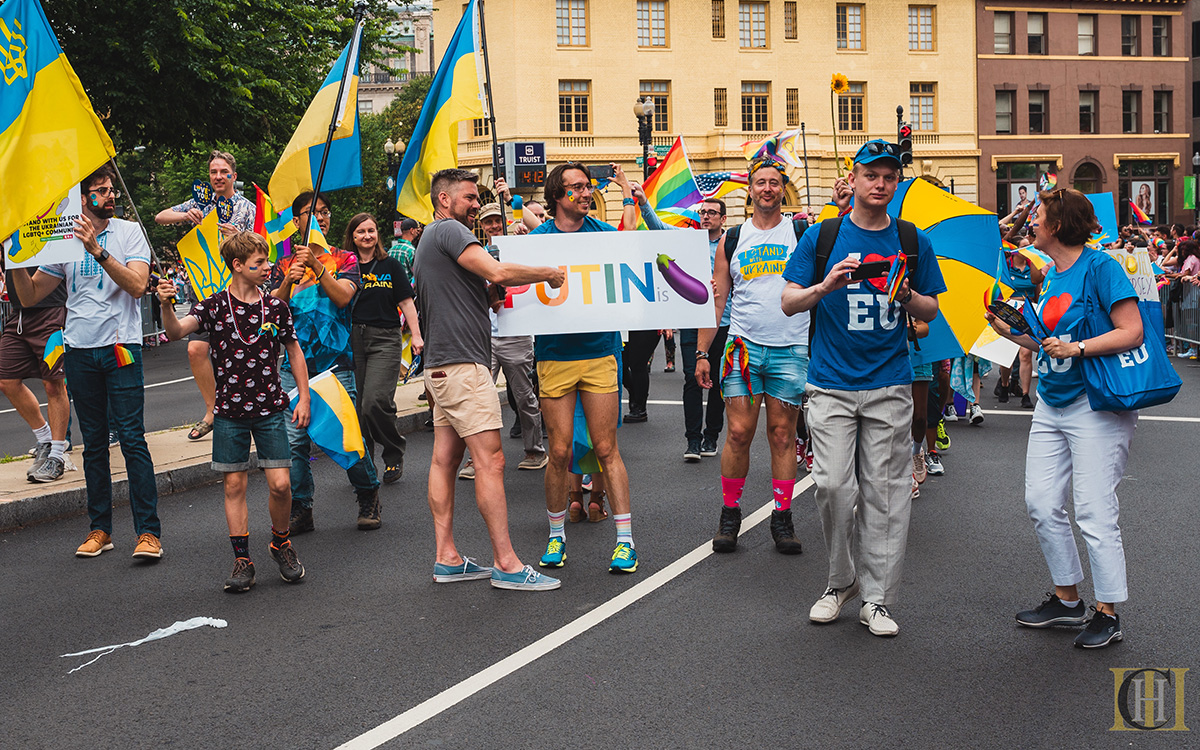
LGBTQI+ as national security for the US
The important nuance that many experts miss is the LGBTQI+ issue in Ukraine and Eastern Europe (and even broader) is a more complicated issue than we think. One of the self-declared reasons Russia justifies its war and invasion of Ukraine is “traditional family values” and their preventing Slavic people from biting the forbidden fruit of GayEurope. When the Russian army took over Mariupol, the biggest TV story on the Russian government channels was a video of how they found the “US strategic center of gays and lesbians in Mariupol.” The fact is that was an office of the local non-government organization that works with USAID on humanitarian projects and happens to have some posters from KyivPride. But even this Russian crusade against liberal values in Europe is not so damaging as their professional disinformation, work, and influences on American society with a false narrative. Right at this moment, thousands of Russians somewhere in a troll farm in the Crimea are making sure for the millions of U.S. citizens in the coming election, the most important issue will be what restroom to choose instead of social security reform.
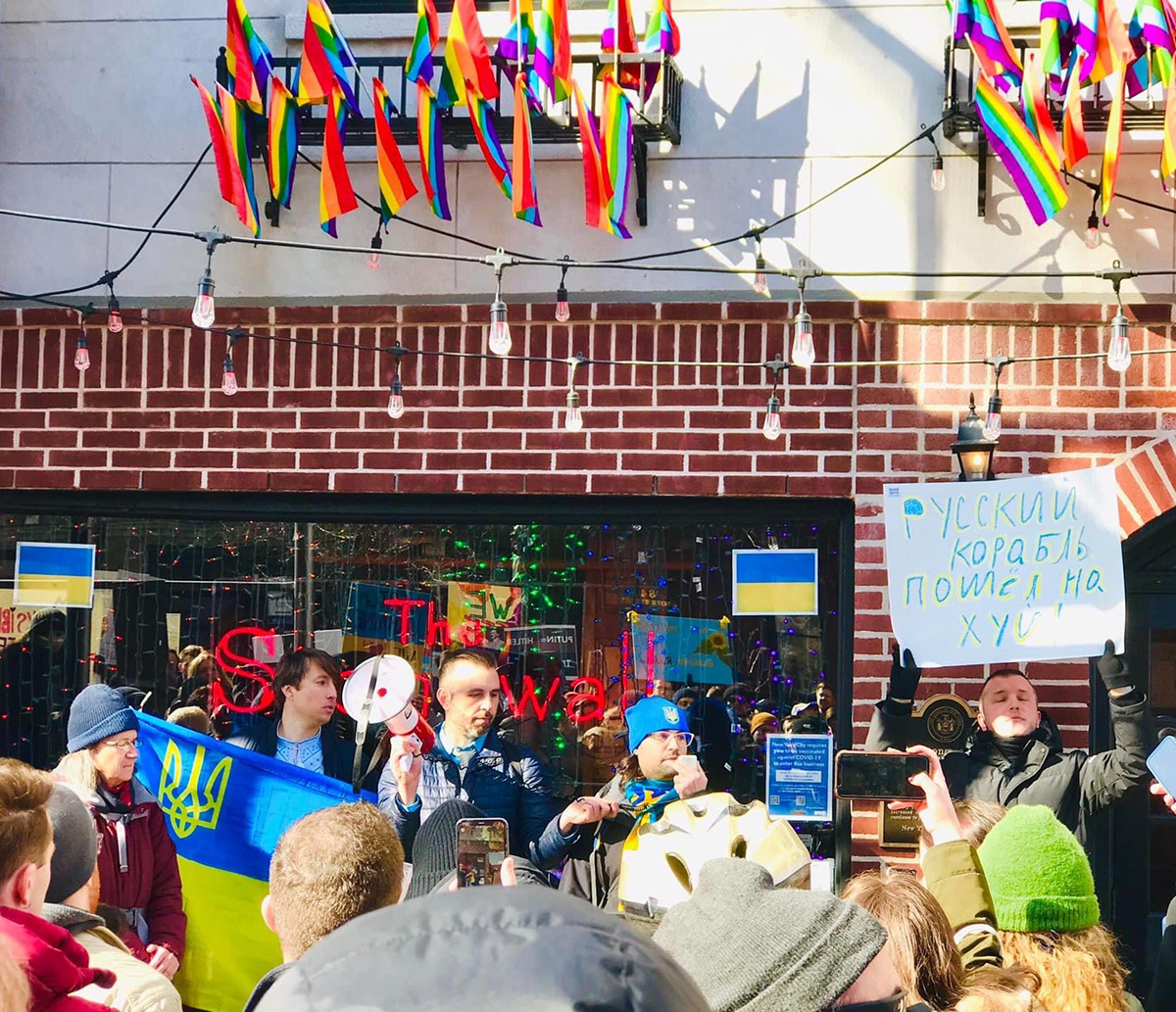
Nina Jankowich, an expert on government strategic communication, in her book How to Lose the Information War gave a few examples of Russian misinformation campaigns that started in Ukraine but had real consequences on the US presidential election in 2020. She asks a question in her book: “The U.S. and the Western world have finally begun to wake up to the threat of attack from Russia … what can the West do about it?”
From my perspective as a Ukrainian by birth, American by choice, and gay by nature, the answer is simple: What if we start not talking about values but implementing them? What if, bit by bit, we will all be together to fight for democratic values and principles? And maybe Russians will never choose another matrix, but our matrix will be stronger and more resilient to the “Evil Empire.”
Bogdan Globa is the president and co-founder of QUA – LGBTQ Ukrainians in America, a former assistant to the Human Rights Committee chair in the Verkhovna Rada (2014-2016) co-founder and CEO of Fulcrum (2012-2016), an LGBTQI+ organization.
Commentary
World ‘isn’t much different today’
The Nazis murdered nearly 1 million Jewish people at Auschwitz

OŚWIȨCIM, Poland — Łukasz, a Polish man who was our group’s English-speaking tour guide at Auschwitz, on April 7 asked us while we were standing outside one of Auschwitz I’s barracks why the Nazis systematically murdered more than 6 million Jewish people.
“Once they are gone, Germany will be great again,” he said, referring to the Nazis’s depraved justification.
There were other Americans in our group of about 40 people. I would like to think they are familiar with the dehumanizing MAGA rhetoric to which our country has become accustomed since President Joe Biden’s predecessor announced his White House bid in 2015. The fact that I was at a Nazi concentration camp was simply overwhelming, and I didn’t feel like speaking with them or to anyone else at that moment.
The unspeakable horrors that happened at Auschwitz are on full display. Łukasz’s comment was a stark warning to us all amid the backdrop of the current socio-political realities in which we in the U.S., Europe and elsewhere around the world currently live.
• Suitcases, glasses, shoes, kitchen utensils, prosthetic limbs, baskets, Jewish prayer shawls, and toothbrushes that were taken from people upon their arrival at Auschwitz were on display in Auschwitz I’s Block 5. One exhibit also contains children’s clothes.
• Auschwitz I’s Blocks 6 and 7 had pictures of male and female prisoners along the corridors. They contained their birthdays, the day they arrived at the camp and when they died. Block 7 also had mattresses and bunk beds on which prisoners slept and the sinks and latrines they used.
• The basement of Auschwitz I’s Block 11 had cells in which prisoners were placed in the dark and starved to death. The basement also had cells in which prisoners were forced to stand for long periods of time. Executions took place at the “Death Wall” in the courtyard between Block 10 and 11. Guards also tortured prisoners in this area.
• Medical experiments took place in Block 10.
• A gas chamber is located near Auschwitz I’s entrance with the gate that reads “Arbeit macht frei” or “Work sets you free.” The adjacent crematorium contains a replica of the furnaces used to burn human bodies.
• An urn with human ashes is in Auschwitz I’s Block 4. Hair cut from people who were killed in the gas chamber was also there.

Auschwitz I, a former Polish army barracks, is one of 40 camps and subcamps around Oświęcim, a town that is roughly 30 miles west of Kraków, Poland’s second-largest city, that became known to the world as Auschwitz. Upwards of 90 percent of the 1.1 million people killed at Auschwitz died at Auschwitz II-Birkenau, which is roughly 1 1/2 miles northwest of Auschwitz I in the village of Brzezinka (Birkenau in German), and more than 90 percent of those murdered upon their arrival were Jewish.
The ruins of two crematoria the Nazis blew up before the Soviets liberated the camp in January 1945 are there. (A group of Israelis were praying in front of them while our group was there.) A train car used to bring people to the camp was also there, along with some of the barracks in which those who were not immediately killed in the gas chambers lived.
Auschwitz II-Birkenau’s sheer size is incomprehensible.

The Nazis killed 6 million Jewish people in the Holocaust. They also murdered gay men, Poles, Roma, Sinti and millions of other people from across Europe.
The day I visited Auschwitz marked six months since Hamas launched its surprise attack against Israel.
More than 1,400 people — including 260 people who Hamas militants murdered at the Nova music festival in Re’im, a kibbutz that is a few miles from the Gaza Strip — have died in Israel since Oct. 7, 2023. The subsequent war has left more than 30,000 Palestinians in the Hamas-controlled enclave dead, and millions more struggling to survive. Oct. 7 was the deadliest attack against Jewish people since the Holocaust. That unfortunate coincidence of dates — Oct. 7 and April 7 — was not lost on me while I was at Auschwitz.
Another striking thing is the area in which the camps are located.
The train from Kraków to Oświęcim passes through idyllic countryside with green meadows, flowering trees and freshly tilled fields. Purple lilacs — like those that bloom each spring on the trees in my mother’s backyard in New Hampshire — were in full bloom inside Auschwitz I. Grass and dandelions were growing amid the remains of Auschwitz II-Birkenau’s barracks. Birds were chirping. The weather was also unseasonably warm with temperatures well over 80 degrees and a cloudless sky.
All of it was beyond surreal.
I visited Auschwitz while on assignment for the Washington Blade in Poland. I interviewed gay Deputy Polish Justice Minister Krzysztof Śmiszek in Warsaw and sat down with activists in the Polish capital and Kraków to talk about the country’s new government and the continued plight of LGBTQ refugees from Ukraine and other countries. My trip began in Budapest, Hungary, and ended in Berlin. I did not write this piece until I on my flight back to D.C. on Tuesday because I could not properly articulate my thoughts about what I saw at Auschwitz.

Governments, politicians, political candidates, and parties in the U.S. and around the world have used specific groups of people to advance a particular agenda, to blame them for what is wrong in their particular country and/or to deflect blame from their own failures. The Nazis and what they did to Jewish people and anyone else they deemed inferior is the most grotesque example of what can happen if such actions are not stopped.
Łukasz told us outside of one of the Auschwitz II-Birkenau barracks at the end of our tour that the world “isn’t that much different today.” He also said that we are “witnesses.”
“It’s up to you how you react to it,” said Łukasz.
Let’s hope we all do our part to make sure the atrocities that happened at Auschwitz never happen again.
Commentary
Preserving our tapestry: Navigating European elections, empowering queer women and the imperative of safe spaces
EU elections will take place in June 9

As the European Union anticipates the upcoming elections in June, a disconcerting wave of transphobic rhetoric has swept across the continent, notably in 21 EU member states, according to a recent report by ILGA-Europe. The 13th Annual Review of the Human Rights Situation of LGBTQ People in Europe and Central Asia stresses the alarming rise in hate speech targeting the LGBTQ and intersex community. This growth in negativity — which particularly is directed at transgender people — raises profound concerns about the state of inclusivity, human rights and democracy within the EU.
The alarming surge of transphobia in European politics
According to the report, there is a trend of hate speech coming from politicians across 32 European countries of which 21 being EU member states. Painting a stark picture of the challenges faced by the LGBTQ community. In a staggering list that includes Austria, Germany, Spain and others, politicians have increasingly weaponized anti-trans rhetoric. Exploiting children is a tactic often used as part of scare strategies to create opposition to trans minors’ access to healthcare and educational facilities, extending this divisive approach to a broader trend where politicians argue that restricting information about LGBTQ people is a necessity to protect minors.

The rise in transphobic rhetoric is not only confined to politics but it has other tangible consequences. The report highlights a concerning escalation in suicide rates and mental health issues, particularly in LGBTQ youth. Violent protests outside schools and libraries have created unsafe environments, adding to the growing list of challenges faced by the community.
The far-reaching impact of demonization by politicians and the introduction of restrictive legislation underscores the need for urgent action. Hate speech is not merely an affront to people’s rights, it is an assault on the very core values upon which the EU was founded. As ILGA-Europe Advocacy Director Katrin Hugendubel notes, human rights, especially those of LGBTQ people, are facing a significant challenge from far-right forces. The exploitation of LGBTQ rights to undermine democracy, human rights and the rule of law highlights the divisive nature of the current political landscape.
As ILGA-Europe prepares to launch the “Come Out 4 Europe” campaign in response to these alarming trends, the need for visible and supportive queer female spaces is more apparent than ever. The campaign, seeking commitments from European Parliament candidates to protect the rights of LGBTQ people, underscores the urgency of safeguarding human rights, democracy and freedom.
The crucial role of queer women in European elections
Belgium, amid this backdrop of rising transphobia, is preparing for the European elections on June 9, 2024. The importance of this electoral process cannot be overstated, especially for queer women. With citizens aged 16 and above casting their votes to elect 22 members of the European Parliament (MEPs), it’s a pivotal moment for the LGBTQ community.
The voting process in Belgium follows EU law, utilizing a proportional representation system. Voters choose one party, either by marking the box above the party list or selecting individual candidates on the list. The total ballot forms for each party determine seat distribution, and preferential votes then decide which candidates secure a seat in the European Parliament.
Educated voting in the European elections is essential to queer women and the importance cannot be stressed enough. Throughout history they have faced unique battles, but this community holds the power to shape policies that directly influence their lives. By engaging in the democratic process, queer women can actively challenge the current surge in hate speech towards trans people by voting for electing representatives who actively advocate for LGBTQ rights.
Representation is more than a mere buzzword. It matters. Understanding candidates’ positions on LGBTQ issues is key and requires educating oneself on candidates’ stances as to allow queer women to vote for representatives who genuinely champion LGBTQ rights. A diverse and inclusive representation ensures that the concerns and voices of the queer community are not just heard but which are acted upon. Decisions within the European Parliament influence policies ranging from anti-discrimination laws to access to healthcare. An informed vote makes sure that legislation promotes equality, acceptance and the protection of LGBTQ rights.
By being educated on the European elections and its candidates, queer women embark on a journey of self-empowerment. By supporting candidates who prioritize inclusive curricula, they contribute to addressing LGBTQ history, health and rights, encouraging a more accepting future.
The undeniable need for physical queer women spaces
Since the European elections are nearing, the importance of physical spaces for queer women to gather and discuss voting and the candidates becomes increasingly evident. While online spaces offer the chance to connect and discuss, they come with their own unique challenges, including the spread of misinformation and miscommunication. In navigating the democratic landscape, the value of in-person gatherings for education and discussion cannot be stressed enough.
The world is saturated with digital information, and misinformation can easily infiltrate online spaces. Physical gatherings allow for a more controlled environment with direct feedback from peers, where queer women can share accurate and reliable information, ensuring a more nuanced understanding of candidates, policies and the electoral process.
In the lead-up to the European elections, we have to recognize that physical spaces for queer women are crucial. They do not only combat misinformation, disinformation and miscommunication but also serve as a vital space for shared learning. In-person gatherings create the foundation for an informed and engaged electorate, promoting a collective voice that resonates in the democratic process. The power of change lies not just in our votes but in the shared wisdom and unity forged in the physical spaces we create together.
The plight of the Crazy Circle and the call for investment in queer women spaces
After the closing of Brussels’ iconic Crazy Circle, a feminist queer space that has served as a safe haven for the LGBTQ community, it becomes increasingly evident that the struggle for queer women-only spaces in Belgium is a critical issue demanding our attention.
For the past five years, Crazy Circle has been a testament to the resilience of the LGBTQ community, creating a safe and celebratory space for queer women and their allies. However, its closure after the previous management leaving for unknown reasons and current fundraising attempt by the new owners to reopen highlight the challenges faced by such spaces in Belgium. These establishments play a vital role not only as social hubs but as catalysts for education, empowerment and advocacy. Fortunately for the new owners they recently reached their fundraising goals and raised over 50,000 euros to reopen Crazy Circle.
The loss of a space like this underscores the broader struggle faced by queer women-only spaces in Belgium. Beyond being social hubs, these spaces are vital agents of change, providing a haven for education, empowerment and advocacy. We must recognize that our commitment to the LGBTQ community extends beyond words.
The “Come Out 4 Europe” campaign by ILGA-Europe serves as a proactive response to the alarming trends in hate speech. It calls for clear political commitments on safeguarding human rights, democracy and freedom from candidates in the upcoming European Parliament elections in June. Belgium, with its own elections on the horizon, stands at a crossroads where the choices made will resonate far beyond its borders.
If we want to inform queer females about campaigns like “Come Out 4 Europe” we need spaces like the Crazy Circle. Its closure is a stark reminder of the fragility of these vital spaces. It’s a call to action, urging us to invest more in preserving and expanding queer women-only spaces. The struggle faced by Crazy Circle is not an isolated incident; it reflects a broader challenge that demands a collective response all over the world.
By fighting to preserve and expand queer women-only spaces, we are not merely safeguarding physical venues. We are investing in the education, empowerment and advocacy of the LGBTQ community. These spaces are not mere bars or gathering spots; they are crucial agents of change and empowerment.
Building a future of inclusivity
As we see what happened to Crazy Circle in Belgium, let us use this moment as a catalyst for change. It is time to rally together behind existing queer women spaces, ensuring their survival and actively working towards expanding and creating new ones. By doing so we empower individuals to educate, advocate, and, most importantly, vote for a future where safety, equality and acceptance prevail for all members of the LGBTQ community. It’s not only a matter of choice to preserve these spaces; it is a commitment to a world where everyone has the right to be safe, heard and celebrated.
In navigating the complex tapestry of the European elections, the empowerment of queer women spaces through informed voting and the preservation of physical queer women spaces become integral threads. As we stand on the precipice of change, our choices today will shape the inclusive and accepting future we envision. Together, let us weave a tapestry that celebrates diversity, protects human rights and builds a future where every voice, especially those of queer women, is not just heard but cherished.
Commentary
Returning to the kibbutz: A journey of heartbreak and hope
Hamas militants attacked Kfar Aza on Oct. 7
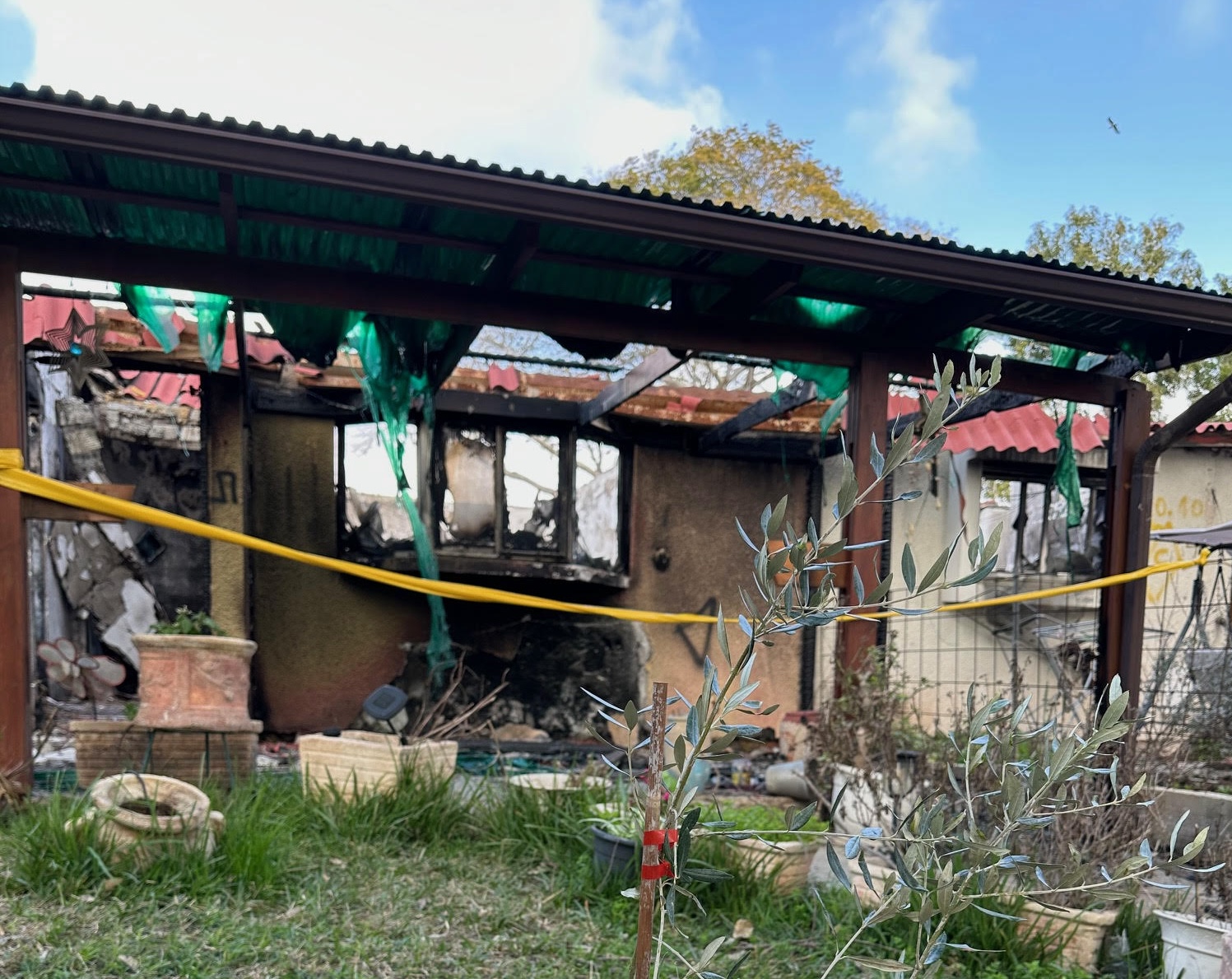
BY K.T. COLIN | In 2019, my first encounter with Israel was through the lens of a sponsored Birthright trip. I embarked on a three-week journey, traversing the diverse landscapes from the northern regions to the eastern territories and finally to the arid southern desert. I had the opportunity to visit different communities within Israel and Palestine. Amidst this exploration, I spent an unforgettable three days and two nights in a kibbutz situated near the Gaza border. The memories etched in my heart were ones of unbridled joy, resilience and the harmonious coexistence of the desert dwellers — an emotional tapestry that forever imprinted itself on my soul. Coming from an Iraqi heritage, I viewed these expressions of coexistence through a lens shaped by my own region’s history of conflict and diversity.
As I recall the Shabbat dinner at the kibbutz, the air resonated with the sacred call to prayers (Adhan) from a nearby Bedouin Arab-Muslim town. The juxtaposition of cultures and faiths was a poignant reminder of the shared humanity that bound the Jewish and Arab Israelis in this region. It was a journey that transcended the ordinary, leaving an indelible mark on my consciousness. Filled with memories of peace and unity, I returned, only to confront a reality far removed from my cherished memories.
Fast forward to last month, when I returned to the Negev Desert, specifically to Kfar Aza — one of the 22 kibbutzim targeted by Hamas on that fateful day, Oct. 7, 2023. The once vibrant oasis, brimming with the light of life, now stood shrouded in the darkness of war-induced death and destruction. The very bench where camaraderie blossomed in 2019, while sharing a moment of connection with an Israeli companion, lay reduced to ashes. The thriving pathways, once bustling with life, had metamorphosed into haunting reminders of blood and rubble. The faces that animated Shabbat gatherings, weaving tales of peace advocacy between Palestinians and Israelis, were now conspicuously absent. In the wake of Hamas’s brutality, no entity — be it human, animal or plant — escaped unscathed. The aftermath resembled scenes from an apocalyptic movie, a tableau of sensory deprivation dominated by the stench of death and the echoes of destruction. This destruction, while uniquely harrowing, echoed the all-too-familiar scenes of conflict from my childhood in Iraq, underscoring the universal tragedy of war.
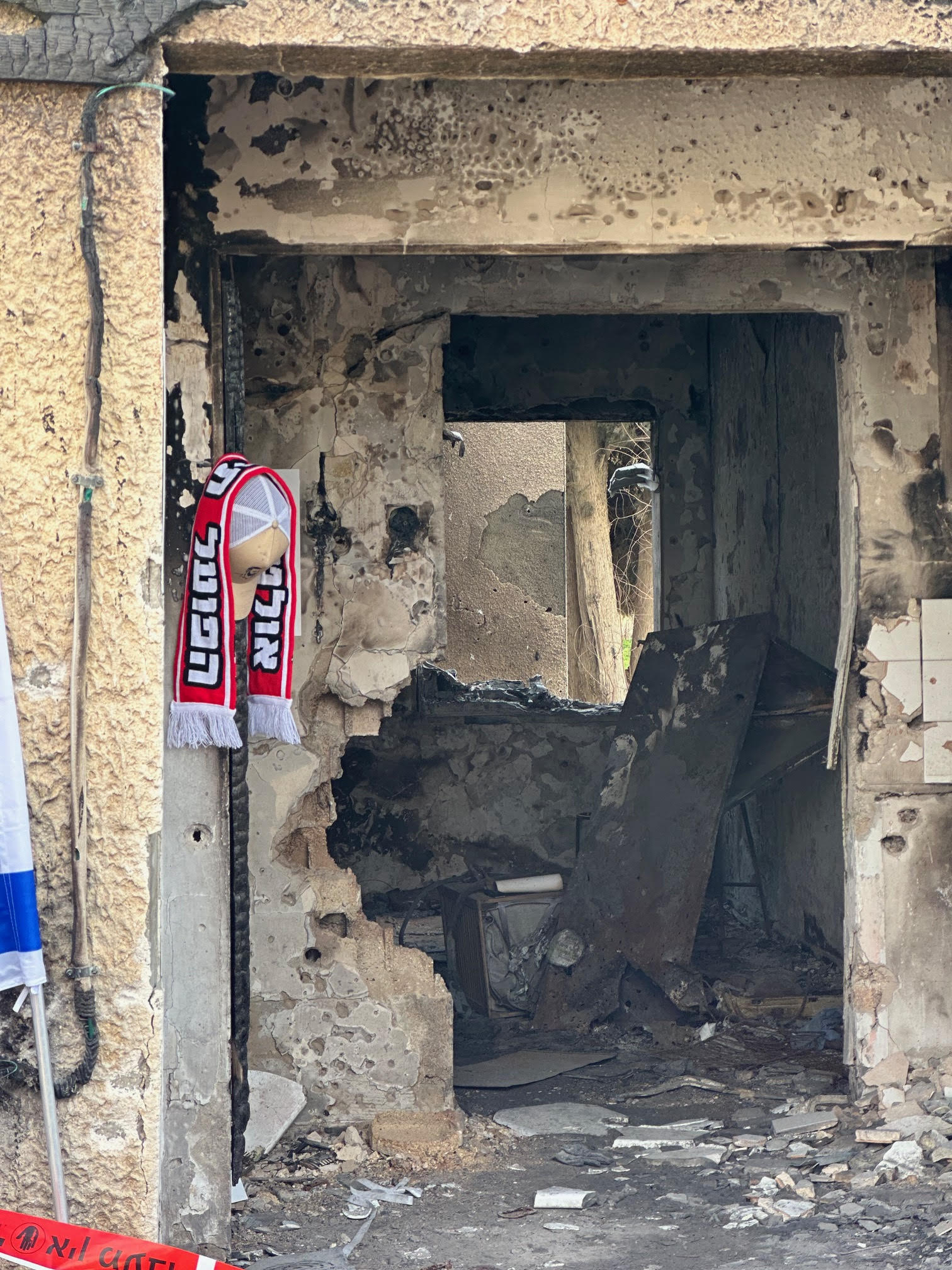
While my roots trace back to Iraq, a land marred by wars and the brutality of conflict, the devastation witnessed in Kfar Aza struck a chord that reverberated with the echoes of my past. My personal journey, from witnessing Saddam’s reign of terror to observing the aftermath in Kfar Aza, underscores a broader narrative of resilience and the enduring hope for peace. Born during the Iraqi-Iranian war, my father’s absence for the first six months of my life spoke volumes about the toll of conflict. The invasion of Kuwait and subsequent wars entrenched the narrative of war as an unwelcome companion in our daily lives. Memories of the U.S. invasion in 2003, the ensuing civil war, and the subsequent loss of rights for women, secular individuals and LGBTQ+ members further underscored the harsh reality of conflict.
Yet, Kfar Aza was a unique chapter in my journey, revealing a form of malevolence that transcended my prior experiences. In their assault, Hamas meticulously targeted specifically peace activists who wanted nothing but peace and prosperity between Israelis and Palestinians, sparing no atrocity in their pursuit. This was not just about taking lives; it was a heinous assault on the very prospect of peace. The evil that unfolded reminded me of the forces mentioned in the Quran — Yaajooj and Maajooj — entities of pure malevolence against whom even Alexander the Great erected a wall, according to Muslim prophecy.
My upbringing in Iraq, under the shadow of Saddam Hussein’s dictatorship, fanned the flames of anti-Semitism. A once diverse Iraq, home to 165,000 Iraqi Jews, witnessed their forced exodus through decades of genocide. Subsequently, Christians, Yazidis and Sabbea Mandaeen fell victim to ethnic cleansing orchestrated by dictatorial regimes, Nazi pogroms, Iranian militias and ISIS. The slow erosion of tolerance and coexistence occurred methodically, propelled by hate campaigns championed by Arab nationalists and later fueled by Islamist movements, plunging Iraq into its darkest era.
My school days were marked by compulsory flag-greeting ceremonies, ostensibly patriotic but laden with hate. The chants of “Death to America; Death to the Zionists; Death to the Jews” echoed through the air, fostering a culture of animosity. Arabization and Nationalism classes further fueled this bigotry, leaving an indelible mark on impressionable minds.
The recent horrors in Kfar Aza echoed memories of a similar brand of terror perpetrated by Saddam’s regime — the Fedaeen of Saddam, a precursor to Hamas’s brutality. The parallels were chilling — beheadings, brutal punishments and a reign of terror continued even after the fall of Saddam, as they joined Al-Qaeda, leaving a trail of atrocities in cities like Fallujah and Ramadi.
As I witnessed the devastation in Kfar Aza, the echoes of war in nearby Beit Hanoun, Gaza, resonated hauntingly. The pain echoed from both sides — the Israeli people enduring Hamas rockets since 2015 and the Palestinians suffering daily under the same regime. My heart shattered for the children left orphaned, the LGBTQ+ Gazans now without shelter or life-saving medications and the vulnerable girls and boys exposed to the horrors of Human trafficking and rape. The theft of humanitarian aid by Hamas left many without food and water, and the lip services to Palestinians by Arab and Muslim majority nations, painting a grim picture of a future hanging in uncertainty for those who survived.
Despite the deep scars of conflict, both in my homeland and here, I see glimmers of hope that guide us toward a shared future. I have endured the darkest chapters of conflict in my past, and I hold onto the belief that one day this war will end. I dream of a future where Israelis and Palestinians coexist in shared spaces, attending the same schools, dining at the same restaurants and dancing in the same nightclubs. Having witnessed such unity among Jews, Druze, Muslims and Christians in Israel, I pray for a day when this reality extends to Gazans and Israelis in the Negev Desert. The journey towards peace is arduous, but the human spirit, resilient and compassionate, holds the promise of a brighter tomorrow.
-

 District of Columbia3 days ago
District of Columbia3 days agoCatching up with the asexuals and aromantics of D.C.
-

 South America3 days ago
South America3 days agoArgentina government dismisses transgender public sector employees
-

 Maine4 days ago
Maine4 days agoMaine governor signs transgender, abortion sanctuary bill into law
-

 District of Columbia4 days ago
District of Columbia4 days agoBowser budget proposal calls for $5.25 million for 2025 World Pride

